
Jawaharlal Nehru was an Indian anti-colonial nationalist, secular humanist, social democrat, statesman and author who was a central figure in India during the middle of the 20th century. Nehru was a principal leader of the Indian nationalist movement in the 1930s and 1940s. Upon India's independence in 1947, he became the first Prime Minister of India, serving for 16 years. Nehru promoted parliamentary democracy, secularism, and science and technology during the 1950s, powerfully influencing India's arc as a modern nation. In international affairs, he steered India clear of the two blocs of the Cold War. A well-regarded author, his books written in prison, such as Letters from a Father to His Daughter (1929), Glimpses of World History (1934), An Autobiography (1936), and The Discovery of India (1946), have been read around the world. The honorific Pandit has been commonly applied before his name.

Jayaprakash Narayan, popularly referred to as JP or Lok Nayak, was an Indian independence activist, theorist, socialist and political leader. He is remembered for leading the mid-1970s opposition against Prime Minister Indira Gandhi, for whose overthrow he had called for a "total revolution". His biography, Jayaprakash, was written by his nationalist friend and the writer of Hindi literature, Rambriksh Benipuri. In 1999, he was posthumously awarded the Bharat Ratna, India's highest civilian award, in recognition of his social service. Other awards include the Magsaysay award for Public Service in 1965.

Rajendra Prasad was an Indian politician, lawyer, Indian independence activist, journalist & scholar who served as the first President of India from 1950 to 1962. He joined the Indian National Congress during the Indian Independence Movement and became a major leader from the region of Bihar and Maharashtra. A supporter of Mahatma Gandhi, Prasad was imprisoned by British authorities during the Salt Satyagraha of 1931 and the Quit India movement of 1942. After the constituent assembly 1946 elections, Prasad served as Minister of Food and Agriculture in the central government. Upon independence in 1947, Prasad was elected as President of the Constituent Assembly of India, which prepared the Constitution of India and served as its provisional Parliament.
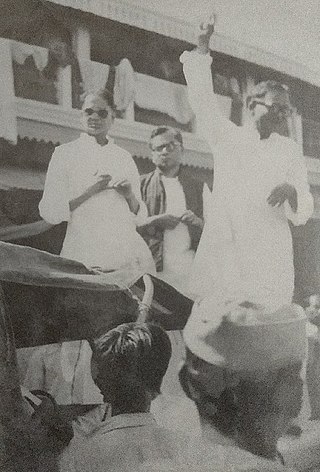
The Congress Socialist Party (CSP) was a socialist caucus within the Indian National Congress. It was founded in 1934 by Congress members who rejected what they saw as the anti-rational mysticism of Gandhi as well as the sectarian attitude of the Communist Party of India towards the Congress. Influenced by Fabianism as well as Marxism-Leninism, the CSP included advocates of armed struggle or sabotage (such as Yusuf Meherally, Jai Prakash Narayan, and Basawon Singh as well as those who insisted upon Ahimsa or Nonviolent resistance. The CSP advocated decentralized socialism in which co-operatives, trade unions, independent farmers, and local authorities would hold a substantial share of the economic power.

Jagjivan Ram, known popularly as Babuji, was an Indian independence activist and politician from Bihar. He was instrumental in the foundation of the All India Depressed Classes League, an organisation dedicated to attaining equality for untouchables, in 1935 and was elected to Bihar Legislative Assembly in 1937, after which he organised the rural labour movement.

Gandhi Maidan is a historic ground in Patna, near the banks of the Ganges River, in Bihar, India. The Golghar falls to its west. During the period of 1824–1833, under British rule, it was used as a golf course and horse racing track and was called Patna Lawns. It is spread across 60 acres of land. It has a great political significance as well.
Prabhavati Devi Narayan was an Indian independence activist from the present-day state of Bihar, and wife of Indian independence and social activist, Jayprakash Narayan.
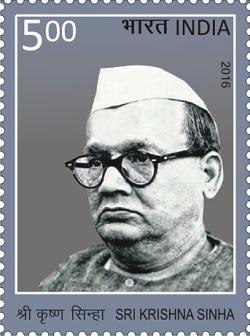
Shri Krishna Singh (Sinha) (21 October 1887 – 31 January 1961), also known as Shri Babu, was the first chief minister of the Indian state of Bihar (1946–61). Except for the period of World War II, Sinha was the chief minister of Bihar from the time of the first Congress Ministry in 1937 until his death in 1961. Along with the Desh Ratna Rajendra Prasad and Bihar Vibhuti Anugrah Narayan Sinha (A.N. Sinha), Sinha is regarded among the 'Architects of Modern Bihar'. He also led the Dalit entry into the Baidyanath Dham temple (Vaidyanath Temple, Deoghar), which reflected his commitment towards the upliftment and social empowerment of the Dalits. He was the first chief minister in the country to abolish the zamindari system. He underwent different terms of imprisonment for a total of about eight years in British India. Sinha's mass meetings brought hordes of people to hear him. He was known as Bihar Kesari for his lionlike roars when he rose to address the masses. His close friend and eminent Gandhian Bihar Vibhuti A.N. Sinha in his essay Mere Shri Babu wrote that, "Since 1921, the History of Bihar has been the history of the life of Shri Babu".
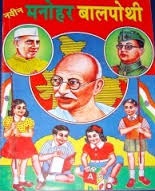
Acharya Ramlochan Saran was a Hindi littérateur, grammarian and publisher. He founded Pustak Bhandar, a publishing enterprise, in Laheriasarai in 1915 and moved his publishing office to Patna in 1929. He also founded a number of magazines: Balak Magazine (1926–1986), Himalaya (1946–1948) and Honhar (1939).
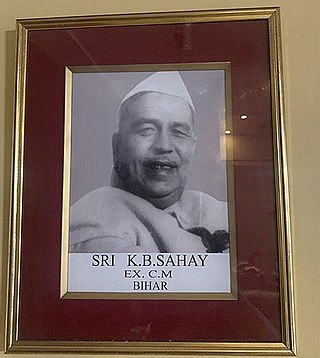
Krishna Ballabh Sahay ,fondly known as K B Sahay was an Indian freedom fighter, who after Indian Independence became the Revenue Minister of Bihar and then became the fourth Chief Minister of unified Bihar.

Basawon Singh or Basawan Singh also known as Basawon Sinha, was an Indian independence activist and a campaigner for the rights of the underprivileged, industrial labourers and agricultural workers.

Lalit Narayan Mishra was an Indian politician who served as Minister of Railways in the government of India from 1973 to 1975. He was brought into politics by the first Chief Minister of Bihar, Krishna Sinha, when he was made parliamentary secretary at his insistence to the First Prime Minister of India, Jawaharlal Nehru. In 1975, he died in a bomb blast at Samastipur railway station. The court case was delayed for years and was finally completed in December 2014.
Satyendra Narayan Sinha was an Indian politician and statesman, participant in the Indian independence movement, a leading light of Jaya Prakash Narayan's ‘complete revolution’ movement during the Emergency and a former Chief Minister of Bihar. Affectionately called Chhote Saheb, he was also a seven-time Member of Parliament from the Aurangabad constituency, a three-term Member of the Bihar Legislative Assembly, and a Member of the Bihar Legislative Council once. Regarded to be one of India's most influential regional people of the time, his reputation was synonymous with being a strict disciplinarian and tough taskmaster.

Anugrah Narayan Sinha, known as Bihar Vibhuti, was an Indian nationalist statesman, participant in Champaran Satyagraha, Gandhian & one of the architects of modern Bihar, who was the first Deputy Chief Minister and the Finance Minister of the Indian state of Bihar (1946–1957). He was also a Member of the Constituent Assembly of India, which was elected to write the Constitution of India and served in its first Parliament as an independent nation. He also held a range of portfolios including Labour, Local Self Government, Public Works, Supply & Price Control, Health and Agriculture. A.N. Sinha, affectionately called Anugrah Babu, was a very close associate of Mahatma Gandhi during the freedom struggle movement and worked with Bihar Kesari Sri Krishna Sinha to lead the Gandhian movement in Bihar. One of the leading nationalists in the Indian independence movement from Bihar after Dr Rajendra Prasad, he was elected as the Congress Party deputy leader in the state assembly to assume office as first Deputy Chief Minister cum Finance Minister of independent Bihar, and re-elected when the Congress Party won Bihar's first general election with a massive mandate in 1952.
Tarkeshwari Sinha was an Indian politician and independence activist from Bihar. Among the first female politicians of the country, she took active role in the Quit India Movement. At the age of 26, she was elected to the 1st Lok Sabha from Patna East constituency in 1952. Subsequently, she was re-elected to the Lok Sabha in 1957, 1962 and 1967 from Barh constituency. She was the first female Deputy Finance Minister in the union cabinet led by prime minister. Jawaharlal Nehru from 1958-64. She had also led a delegation to the U.N. and Tokyo. Gulzar’s critically acclaimed movie, Aandhi was partly inspired by Tarkeshwari Sinha, apart from Indira Gandhi.

Madhav Shrihari Aney ; popularly referred to as Loknayak Bapuji Aney or Bapuji Aney, was an ardent educationist, freedom fighter, statesman, a modern Sanskrit poet and a politician. He was also conferred with the title of "Loknayak Bapuji", which means "The People's Leader and Respected Father". He was one of the founders of the Congress Nationalist Party. He was first among the eminent disciples of Lokmanya Tilak such as N C Kelkar, Kakasaheb Khadilkar, Gangadhar Deshpande, Dr B S Munje, Abhyankar, T B Paranjpe and Vaman Malhar Joshi, who walked in the footsteps of Tilak. Accepting the leadership of Mahatma Gandhi on the death of Bal Gangadhar Tilak. Aney persuaded his colleagues to see the writing on the wall. At the same time he was not blind in his loyalty. He disapproved Congress throwing itself in Khilafat Movement and warned against excessive wooing of Muslims at the cost of national interests. He regarded unity at any price as elusive and dangerous. Since the best safeguard for the minority was the goodwill of the majority. He never permitted his critical faculties to be blurred by emotion. Mahatma Gandhi admiring his calm logic, confided in him and often sought his counsel. He was chosen to arbitrate the disputes between Subhash Chandra Bose and Jatindra Mohan Sengupta. He was never a breaker or a destroyer but was always a cementing factor believing in synthesis and not in segregation.
Syed Mahmud (1889–1971) was an Indian politician and senior leader in the Indian National Congress during the Indian independence movement and in post-independence India.

Litterateur and parliamentarian Shankar Dayal Singh was twice elected to the Parliament of India. He was one of the youngest members of the Fifth Lok Sabha, in which he represented the Chatra parliamentary constituency in Bihar. Contesting his maiden Lok Sabha election in 1971, he defeated Smt. Vijaya Raje, the wife of Sri Kamakhya Narayan Singh, Raja of Ramgarh. He was again elected to the upper house, the Rajya Sabha, in 1990 from Bihar.

Sachchidananda Sinha was an Indian lawyer, parliamentarian, and journalist. He is considered to be the father of Modern Bihar and first president of the Indian constitutional assembly which drafted the constitution of India.
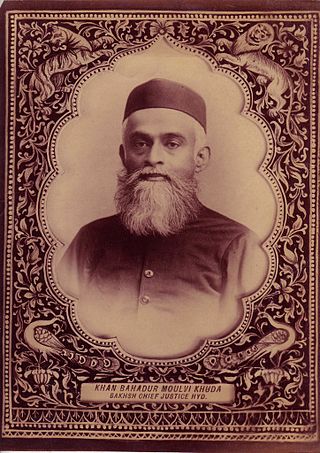
Hon'ble Dr. Justice Sir Khan Bahadur Khuda Bakhsh OIE was an Indian Polymath who was an advocate, judge, philosopher, explorer, revolutionary freedom fighter, scholar and historian from Patna, Bihar. He was the founder of Khuda Bakhsh Oriental Library and Chief Justice of Nizam's Supreme Court of Hyderabad from 1895 to 1898. He is considered to be one of the most prominent Indian Muslim along with APJ Abdul Kalam.
















